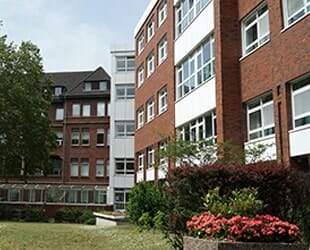The management and staff of the neurological clinic maintain a long tradition of close relationship between emergency diagnosis, emergency therapy and early rehabilitation. At the time of hospitalization of the patient, an integrative treatment and rehabilitation program is determined, including urgent measures and early rehabilitation.
Within the framework of this program, all neurological patients are treated, including patients with chronic inflammatory or immunopathological diseases of the central nervous system, such as multiple sclerosis, myasthenia gravis (myasthenia gravis) or polyneuritis, using, depending on the indications, immunomodulatory, as well as immunosuppressive therapy, with follow-up care for these patients.
For a reliable diagnosis of damage to peripheral nerves, special neurophysiological studies are preliminarily carried out, which allow you to make an accurate diagnosis and prescribe the optimal treatment.
Vascular diseases of the brain
One of the leading activities of the clinic is the diagnosis, treatment and prevention of cerebrovascular accidents of various origins. The decisive task here is to identify potential risk factors, their conservative elimination to prevent further relapses, as well as intensive early rehabilitation in the first days of the disease. The clinic actively cooperates with neurosurgeons to perform such surgical interventions as, for example, craniotomy, indicated for malignant cerebral infarction (complete infarction of the middle cerebral artery).
Movement disorders
Particular attention is paid to the treatment of patients suffering from Parkinson's disease and other movement disorders, cerebrovascular diseases, neurological disorders in HIV infection, neuromuscular diseases such as polyneuropathy, myopathies, and myasthenia gravis. In case of movement disorders, botulinum toxin injections are offered as a therapy for dystonia and spasticity, among other things.
The medical team specializes in the implantation of electrodes for deep stimulation (“brain stimulator”). This method is suitable for the treatment of drug-resistant movement disorders, including Parkinson's disease.
chronic pain syndrome
The problem of chronic pain syndrome can be solved with the help of conventional infiltration anesthesia or blockade of peripheral nerves.
Also, in collaboration with colleagues from neurosurgery and anesthesiology clinics, for long-term or permanent relief of pain syndromes, and in the treatment of spasticity, the method of intrathecal drug administration is also used: a thin catheter is inserted into the spinal canal and connected to a programmed drug pump implanted under the skin, providing thereby a continuous flow of painkillers or antispasmodic drugs in small doses directly into the cerebrospinal fluid. Along with this therapy, a non-catheter method of intrathecal pharmacotherapy is also used - bolus administration of analgesic drugs. Thus, the dose of the analgesic can be increased without increasing its side effects.
Epilepsy
The clinic provides care to patients suffering from epileptic seizures that are not sufficiently treatable with standard anticonvulsant drugs. Patients with epilepsy who wish to have a child, along with a new approach to drug correction, discussion of the therapy and its possible side effects, together with the gynecological clinic, are provided with therapeutic assistance up to delivery.
Psychological support
Specially trained psychologists help patients cope with critical life situations that arose as a result of the disease or, on the contrary, provoked it.
Head of the neurology clinic
Head of the Rehabilitation Neurological Center
Video
Request appointment
Useful links
Photo gallery











